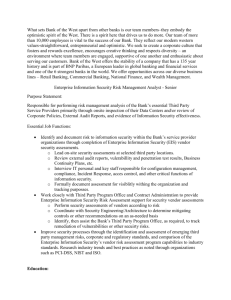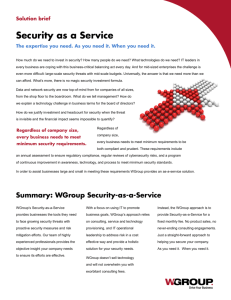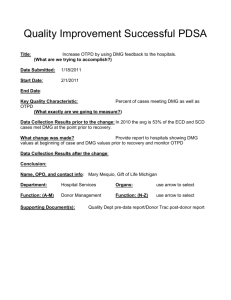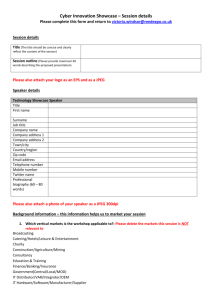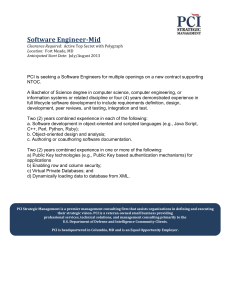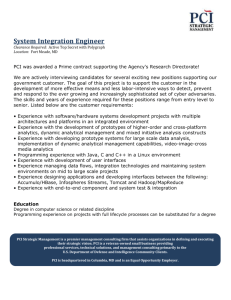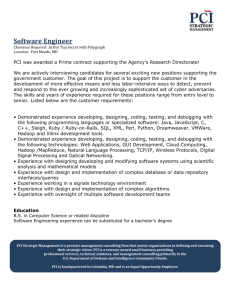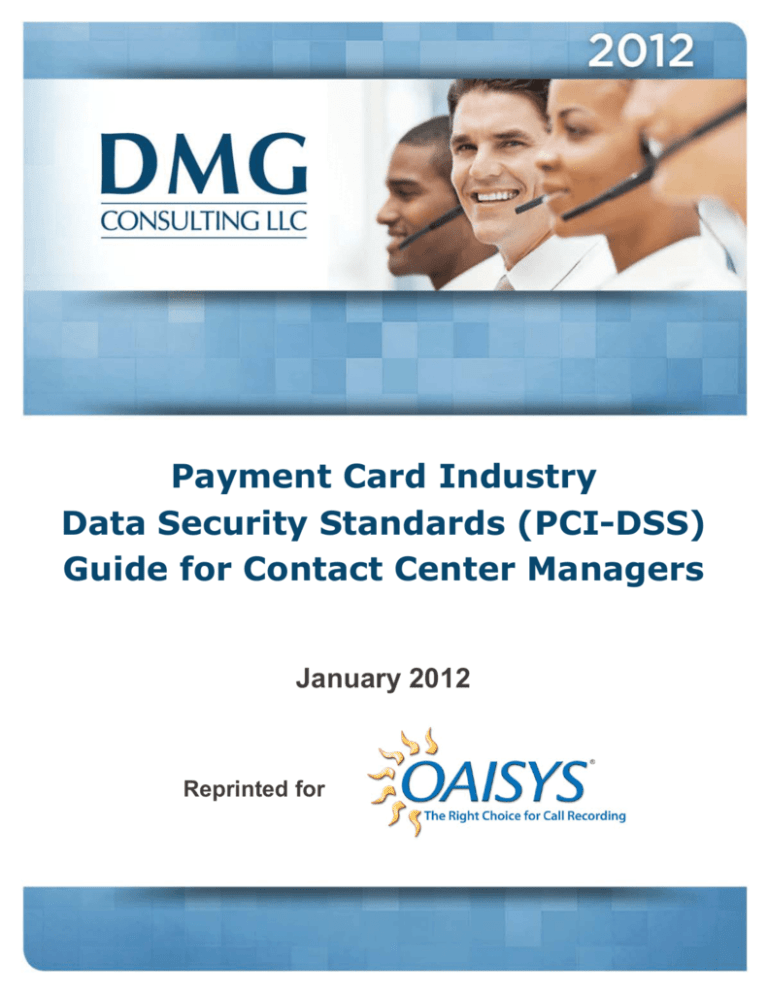
Payment Card Industry
Data Security Standards (PCI-DSS)
Guide for Contact Center Managers
January 2012
Reprinted for
Payment Card Industry Data Security Standards (PCI-DSS)
Guide for Contact Center Managers
Table of Contents
Executive Summary ........................................................................................................ 1
What is PCI-DSS? ........................................................................................................... 1
Violation Notification Requirements................................................................................. 7
Is PCI-DSS a Law? ......................................................................................................... 8
The Implications of PCI-DSS for Contact Centers ........................................................... 8
Vendor Methods of Adhering to PCI-DSS ....................................................................... 9
What Are The Most Applicable Standards for Contact Centers?................................... 10
How Should Contact Centers Protect Cardholder Information? .................................... 12
PCI and At-Home Agents and Supervisors ................................................................... 14
Final Thoughts .............................................................................................................. 15
Endnotes ....................................................................................................................... 16
About OAISYS .............................................................................................................. 17
About DMG Consulting.................................................................................................. 17
© 2012 DMG Consulting LLC. All rights reserved, January 2012
-i-
Payment Card Industry Data Security Standards (PCI-DSS)
Guide for Contact Center Managers
Executive Summary
Credit and debit cards, which are referred to as payment cards, are the most common
form of debt payment. According to the U.S. Federal Reserve Bank of Boston, more
than 50% of all transactions are made with payment cards, and 63% of payment card
transactions involve a retailer or other consumer-related organization. 73% of U.S.
households have at least one payment card, and the average is three. (1)
National, state and local governments require companies to safeguard consumer
information, including the information on payment cards. In response, the largest
payment card brands established the Payment Card Security Council and the Payment
Card Industry Data Security Standard (PCI-DSS). This standard is a set of voluntary
requirements and provides common benchmarks for payment card issuers, processors
and merchants with regard to payment card data security. PCI-DSS is an international
standard accepted in markets throughout North America, Latin America, Europe, the
Middle East, and Asia. It covers areas such as data center security, protection of data
during transmission, and standard operating procedures. While the standard is widely
accepted by the credit card companies, there is still significant confusion in many
companies that handle credit card payments about what PCI compliance means and
exactly how it applies to them.
The purpose of this guide is to explain PCI-DSS and its impact on contact centers. This
document clarifies the circumstances when organizations are required to adhere to
these guidelines, and provides the accepted approaches used by contact centers to be
in compliance.
What is PCI-DSS?
The Payment Card Industry Data Security Standard was developed through the
combined efforts of five of the largest payment card brands: American Express, Visa,
MasterCard, Discover and JCB International. It was established to provide guidance to
merchants and payment card processors about securing personal customer data
located on cards and on the cards’ magnetic strip. PCI-DSS version 1.1 was released in
2006 and has since been enhanced a number of times. The Payment Card Security
Council released the current standard, Version 2, in October 2010.
PCI-DSS is comprised of 12 broad requirements that set a baseline against which to
measure and grade a vendor’s data security practices, and provides mechanisms for
members of the Payment Card Industry to self-regulate and self-police. The PCI-DSS
does not dictate how a company must provide security.
© 2012 DMG Consulting LLC. All rights reserved, January 2012
-1-
Payment Card Industry Data Security Standards (PCI-DSS)
Guide for Contact Center Managers
The following requirements make up the current PCI-DSS:
Build and Maintain a Secure Network
•
Requirement 1: Install and maintain a firewall configuration to protect cardholder
data
•
Requirement 2: Do not use vendor-supplied defaults for system passwords and
other security parameters
Protect Cardholder Data
•
Requirement 3: Protect stored cardholder data
•
Requirement 4: Encrypt transmission of cardholder data across open, public
networks
Maintain a Vulnerability Management Program
•
Requirement 5: Use and regularly update anti-virus software
•
Requirement 6: Develop and maintain secure systems and applications
Implement Strong Access Control Measures
•
Requirement 7: Restrict access to cardholder data by business need-to-know
•
Requirement 8: Assign a unique ID to each person with computer access
•
Requirement 9: Restrict physical access to cardholder data
Regularly Monitor and Test Networks
•
Requirement 10: Track and monitor all access to network resources and
cardholder data
•
Requirement 11: Regularly test security systems and processes
Maintain an Information Security Policy
•
Requirement 12: Maintain a policy that addresses information security
Each requirement above has more specific sub-requirements. Detailed information
about the standards is available at www.pcisecuritystandards.org.
© 2012 DMG Consulting LLC. All rights reserved, January 2012
-2-
Payment Card Industry Data Security Standards (PCI-DSS)
Guide for Contact Center Managers
Below are a few common questions about PCI-DSS:
Who must comply?
Any business that accepts (merchant) or processes (processor) payment cards issued
through the brands Visa, MasterCard, American Express, Discover and JCB
International needs to be PCI compliant.
What information do the standards cover?
PCI-DSS covers the security of payment card information (such as account number,
personal identification number (PIN), and Card Validation Value (CVV) or code) through
the entire transaction network. The standard requires merchants and payment card
processors to ensure that customer data are secured at the point of sale, while being
transmitted throughout the company’s network, and while being transmitted between
merchants and processors. The data security standards also cover when and how
payment card information is stored.
PCI-DSS specifically targets information stored on payment cards (embossed onto the
card, printed on the card, or recorded on the magnetic stripe). The data may include,
but is not limited to:
•
Owner’s name
•
Account number
•
Card Validation Value (or code)
•
Personal Verification Value (PVV) or Personal Identification Number (PIN)
•
Expiration date
PCI-DSS is not concerned with other non-public information such as social security
number, driver’s license number, card owner’s address, etc., unless the information is
stored on the payment card’s magnetic strip.
Who maintains and modifies the requirements?
To develop and regulate the PCI-DSS, American Express, Visa, MasterCard, Discover
and JCB International organized the PCI Security Standards Council. (These five card
processing companies are referred to as “the brands” throughout this paper.) To avoid
antitrust concerns, the Council has no enforcement powers; this remains the
responsibility of the individual brands. The Council provides the umbrella structure, sets
© 2012 DMG Consulting LLC. All rights reserved, January 2012
-3-
Payment Card Industry Data Security Standards (PCI-DSS)
Guide for Contact Center Managers
policies, establishes common auditing and scanning procedures, and certifies
assessors and scanners. It is up to each of the five card brands to interpret and enforce
the standards.
The PCI Security Council uses a five-step, 24-month lifecycle process to maintain and
update the security standard. The five steps include:
•
Marketing implementation
•
Gathering feedback from members
•
Reviewing the feedback and revising the standards accordingly
•
Releasing a final draft for final review
•
Eliciting feedback from members and releasing a final revision
Who is responsible for enforcing compliance?
It is up to each of the five brands to interpret and enforce the standards. Each brand has
implemented programs and established different levels of compliance. Part of what
causes confusion in the market is that each brand has slightly different definitions and
guidelines. The brands categorize merchants and processors based on the number of
transactions they process each year, referred to as “levels.” Figure 1 below presents the
levels for the five card brands.
Figure 1: Card Company Annual Transaction Levels
Company
Visa
2
MasterCard
3
American Express
Discover
5
JCB International
6
4
Level 1
Level 2
Level 3
Level 4
6 million+
Between 1 and 6
million
Between 20,000
and 1 million
Less than
20,000
6 million+
Between 1 and 6
million
Between 20,000
and 1 million
Less than
20,000
2.5 million+
Between 50,000
and 2.5 million
Less than
50,000
N/A
6 million+
Between 1 and 6
million
Between 20,000
and 1 million
Less than
20,000
More than 1
million
Less than 1
million
N/A
N/A
To assist companies in assessing their data security so that they can find potential data
breaches, the Council certifies two “classes” of companies or individuals. A Qualified
Standards Assessor (QSA) is a company or individual whose task it is to measure a
© 2012 DMG Consulting LLC. All rights reserved, January 2012
-4-
Payment Card Industry Data Security Standards (PCI-DSS)
Guide for Contact Center Managers
merchant or card processor’s data security policies, procedures and technology against
the requirements documented in the PCI-DSS regulations. They are also responsible for
reporting to the Council and the appropriate brand how well the merchant or card
processor complies with PCI-DSS standards.
An Approved Scanning Vendor (ASV) is a company or individual who is responsible for
electronically scanning a corporation’s network, including their interfaces to all
associated merchants and card processors, to identify potential security breaches.
ASVs then report the outcomes to the Council, company and brand.
The brands have different scanning and assessment requirements for each level. Figure
2 lists the assessment and scanning requirement for each level as defined by the
brands.
Figure 2: PCI-DSS Scanning and Assessment Requirement Guidelines
Company
Visa
7
MasterCard
8
Level 1
Level 2
Level 3
Level 4
Annually:
Assessment by
a Qualified
Standards
Assessor
Annually: Selfassessment
using the PCI
Self-Assessment
Questionnaire
Annually: Selfassessment
using the PCI
Self-Assessment
Questionnaire
Annually: Selfassessment
using the PCI
Self-Assessment
Questionnaire
(Recommended)
Quarterly:
Network scans
by an Approved
Scanning
Vendor
Quarterly:
Network scans
by an Approved
Scanning
Vendor
Quarterly:
Network scans
by an Approved
Scanning
Vendor
Annually:
Assessment by
a Qualified
Standards
Assessor
Annually: SelfAssessment
Questionnaire
Annually: SelfAssessment
Questionnaire
Quarterly:
Network scans
by an Approved
Scanning
Vendor
Quarterly:
Network scans
by an Approved
Scanning
Vendor
Quarterly:
Network scans
by an Approved
Scanning
Vendor
Quarterly:
Network scans
by an Approved
Scanning
Vendor
Quarterly:
Network scans
by an Approved
Scanning
Vendor
American Express
9
Annually:
Assessment by
a Qualified
Standards
Assessor
© 2012 DMG Consulting LLC. All rights reserved, January 2012
Quarterly:
Network scans
by an Approved
Scanning
Vendor
(Recommended)
Annually: SelfAssessment
Questionnaire
(Recommended)
Quarterly:
Network scans
by an Approved
Scanning
Vendor
(Recommended)
N/A
-5-
Payment Card Industry Data Security Standards (PCI-DSS)
Guide for Contact Center Managers
Figure 2: PCI-DSS Scanning and Assessment Requirement Guidelines
Company
Level 1
Level 2
Level 3
Level 4
(Recommended)
Quarterly:
Network scans
by an Approved
Scanning
Vendor
Discover
10
JCB International
11
Annually:
Assessment by
a Qualified
Standards
Assessor
Annually: Selfassessment
using the PCI
Self-Assessment
Questionnaire
Annually: Selfassessment
using the PCI
Self-Assessment
Questionnaire
Quarterly:
Network scans
by an Approved
Scanning
Vendor
Quarterly:
Network scans
by an Approved
Scanning
Vendor
Quarterly:
Network scans
by an Approved
Scanning
Vendor
Annually:
Assessment by
a Qualified
Standards
Assessor
Annual: Selfassessment
using the PCI
Self-Assessment
Questionnaire
N/A
Quarterly:
Network scans
by an Approved
Scanning
Vendor
Quarterly:
Network scans
by an Approved
Scanning
Vendor
Annually: Selfassessment
using the PCI
Self-Assessment
Questionnaire
(Recommended)
Quarterly:
Network scans
by an Approved
Scanning
Vendor
(Recommended)
N/A
Level 1 processors and merchants must be audited by third-party QSAs annually, and
must have their corporate networks scanned quarterly by third-party ASVs. Level 2 and
3 vendors must have their corporate network scanned by ASVs every quarter, but can
self-certify their security processes annually. Level 4 vendors can self-certify and selfscan. While it is not required for Level 4 merchants to self-certify and self-scan, the
brands strongly recommended that they do so. Furthermore, Discover, Visa and
MasterCard data security procedures also allow Level 3 card processors to require their
Level 4 merchants to prove the same level of PCI-DSS compliance as Level 3
merchants.
Each brand has a separate enforcement organization that evaluates the scans and
assessments for the Council and determines if a merchant or card processor is PCI
© 2012 DMG Consulting LLC. All rights reserved, January 2012
-6-
Payment Card Industry Data Security Standards (PCI-DSS)
Guide for Contact Center Managers
compliant. Each brand sets the time frame for scans and assessments. They write the
individual policies and procedures into the contractual agreements between processors
and merchants and the branding company. Brands can fine their members and require
additional security actions if a merchant is found to be in violation of the standards.
Information on the brands’ policies and procedures can be found through the
organizations listed below:
•
Visa (US) Card Information Security Program (www.visa.com/cisp)
•
Visa (Canada) Account Information Security Program
(www.visa.ca/en/merchant/fraud-prevention/account-informationsecurity/index.jsp)
•
Visa (Europe) Account Information Security Program
(www.visaeurope.com/aboutvisa/security/ais)
•
Visa (Asia) Account Information Security Program (www.visaasia.com/ap/sea/merchants/riskmgmt/ais.shtml)
•
MasterCard Site Data Protection program (www.mastercard.com/us/SDP)
•
American Express Data Security Operating Policy
(www.americanexpress.com/datasecurity)
•
JCB International Data Security Program (www.jcb-global.com/english/jdsp)
•
Discover (http://www.discovernetwork.com/fraudsecurity/disc.html)
Violation Notification Requirements
If a merchant or payment card processor is found to be in violation or discovers a
security breach, they must alert the brand immediately. Each brand has a different
process to report and repair a security breach. While these plans are unique to each
brand, they are similar in terms of:
•
Limiting the exposure
•
Conducting a thorough investigation of the cause and determining the extent of
the compromise
•
Providing a complete accounting to the brand’s security program of what was
affected
© 2012 DMG Consulting LLC. All rights reserved, January 2012
-7-
Payment Card Industry Data Security Standards (PCI-DSS)
Guide for Contact Center Managers
Is PCI-DSS a Law?
The Payment Card Industry Data Security Standard is not mandated by any national
government. However, data protection requirements spelled out in laws such as the
Gramm-Leach-Bliley Act (US) 12, the Data Protection Act of 1998 (UK), EU Directive
95/46/EC, and the Personal Information Protection Law (Japan) require companies to
guarantee the security of all non-public and personal customer information that they
accept, transmit and store. Only one US state, Nevada 13, has enacted PCI-DSS into
law in its entirety. Other states, like Minnesota 14, have written parts of the standards
into law. While not mentioning PCI-DSS specifically, most states have passed laws
mandating protection of customers’ personal data by merchants and payment card
processors. (For example, see Massachusetts’s Standards for the Protection of
Personal Information of the Residents of the Commonwealth 15.) Finally, almost all
states require state agencies that accept payment cards to be PCI compliant.
The Implications of PCI-DSS for Contact Centers
In March 2011, the Payment Card Security Council published a document called
“Protecting Telephone-based Payment Card Data.” This document, which is called an
information supplement, was intended to address concerns and questions related to
how PCI-DSS affects contact center operations and, specifically, how recordings need
to be handled. Unfortunately, the document is similar to other ones put out by this
organization in that it is both broad and vague. It attempts to provide some general
guidelines for handling secure customer credit and debit card information (credit and
payment card numbers and the CVV) in call and screen recordings.
Contact Center Responsibilities:
All businesses that accept or process payment cards issued through the brands Visa,
MasterCard, American Express, Discover and JCB International have to be PCI
compliant.
The PCI-DSS guidelines are intended to be implemented by merchants and other retail
businesses to ensure that payment card data is secure while stored and transmitted
between the point of sale and the brands. Businesses and the brands are responsible
for ensuring that all data transmission systems, network segments and data storage
solutions comply with the Data Security Standard; this includes any wired, wireless,
private and public networks. Security starts at the point where payment card information
is received by the business, whether from a Web-based ordering system, swiped into a
© 2012 DMG Consulting LLC. All rights reserved, January 2012
-8-
Payment Card Industry Data Security Standards (PCI-DSS)
Guide for Contact Center Managers
point-of-sale device, or given to a contact center agent over the telephone; it ends with
the brands.
Contact center applications cannot be PCI compliant, but they can help their users
adhere to the requirements. (Only solutions that accept and process payment cards –
card readers and online payment card validation solutions – can be PCI compliant). Call
and screen recording solutions, customer relationship management (CRM) applications,
billing systems, and Voice over Internet Protocol (VoIP) phone systems, etc., cannot be
PCI-DSS compliant.
PCI-DSS does not require contact centers to use PA-DSS-certified solutions. That said,
contact centers that process large volumes of payment card transactions need to be
PCI-DSS compliant. They should work closely with their recording, quality assurance
and CRM application providers to ensure they meet appropriate security protocols and
operate within a secure network so that they comply with PCI-DSS requirements. More
importantly, contact centers and IT departments must use the solutions correctly,
employing all security features.
Vendor Methods of Adhering to PCI-DSS
PCI-DSS has taken on a life of its own. Many contact centers have adopted PCI-DSS
as their security standard, though this was never intended to be its purpose. The
purpose of PCI-DSS was to minimize (as it can never be eliminated) the risk of private
payment card information getting into the wrong hands. To achieve this goal,
organizations must limit access to recordings that contain private payment card data –
specifically, the card number and the CVV. Organizations have gone to the next level to
try to prevent this information from being recorded. (If it’s not recorded it cannot be
heard during a playback.) And now, organizations are trying to prevent their agents from
hearing this information at all.
PCI-DSS states that unless it is necessary for legal or regulatory reasons or to meet the
operational needs of the business, payment card information should not be saved and
stored. Moreover, the CVV must never be captured and stored. The industry challenge
is how to best adhere to these guidelines. Contact centers need technology to assist
them in meeting these requirements.
Companies depend upon their vendor to deliver functionality that addresses these
needs. Many approaches have been introduced to help companies meet PCI-DSS
requirements. These include the following:
© 2012 DMG Consulting LLC. All rights reserved, January 2012
-9-
Payment Card Industry Data Security Standards (PCI-DSS)
Guide for Contact Center Managers
1. Recordings are encrypted from point of capture, and codes are used to decrypt
to conversation.
2. A manual pause/resume capability is provided for agents – in other words, when
a customer shares information that is considered sensitive, the agent manually
hits a button (hardware or software-based) that pauses the recording. The agent
then hits it again to resume recording.
3. Fully automated recording pause/resume functionality is being delivered in two
ways today:
a. An API is used to integrate the recording solution to the servicing (CRM)
application. When an agent accesses the area of the servicing application
that is considered sensitive, the recording is automatically paused. When the
agent leaves the sensitive area, the recording automatically resumes. IT
resources from either the vendor, enterprise or both are required to
implement this solution.
b. Desktop analytics is used instead of an API. It works in exactly the same way,
except that these applications do not require changes at the code level, so
they may not require IT resources to build the integration.
4. Speech analytics is used to identify sensitive information in captured recordings.
The sensitive data is then deleted and the recording is stored without it.
5. Speech analytics is used to identify sensitive information in real time, and pauses
the recording when necessary.
6. An IVR is used to capture all credit card information. (The agent would transfer
the customer into the IVR.)
7. Detailed audit trail reports show all access to recordings.
Since companies that process payment cards need to adhere to multiple security
requirements, they need to find vendors that can meet their needs based on their
interpretation of the standards. The PCI-DSS functionality available from recording
vendors has matured significantly during the past 12 months, but the offerings vary
greatly. There are also some stand-alone vendors that are delivering functionality to
help them adhere to PCI-DSS.
What Are The Most Applicable Standards for Contact Centers?
While all 12 requirements may have some relevancy to contact centers and their
systems, the most significant requirements are:
© 2012 DMG Consulting LLC. All rights reserved, January 2012
- 10 -
Payment Card Industry Data Security Standards (PCI-DSS)
Guide for Contact Center Managers
•
Requirement 3: Protect stored cardholder data
•
Requirement 4: Encrypt transmission of cardholder data across open, public
networks
•
Requirement 12: Maintain a policy that addresses information security
In addition, there are some sub-requirements that also apply to contact centers. These
include:
Requirement 3 obliges businesses that store payment card data to ensure that their
storage solution is highly secure. Companies need to:
•
Store payment card data only when absolutely necessary, and have a disposal
procedure in place
•
Display only as much of the card number as necessary, such as the last four
digits of the number for verification purposes
•
Ensure that customer information is stored as encrypted data using strong
cryptography protocols
•
Allow access to the personal identification number and the CVV within the record
only on a need-to-know basis, and prevent users from being able to search for
the code by encrypting it
Requirement 4 targets the transmission of payment card data across networks. It
requires companies to:
•
Use strong encryption protocols such as Secure Socket Layer and Transport
Layer Security (SSL/TLS) or Internet Protocol Security (IPSEC) to provide secure
transmission of data over the network
•
Never send payment card information over an unencrypted medium such as
chat, SMS/text or email
Requirement 12 targets how PCI-DSS is communicated and monitored. It requires
companies to:
•
Establish, publish, maintain and disseminate a security policy that:
o Addresses all PCI-DSS requirements
o Includes an annual process that identifies threats and vulnerabilities and
results in a formal risk assessment
o Includes annual reviews and updates when the environment changes
© 2012 DMG Consulting LLC. All rights reserved, January 2012
- 11 -
Payment Card Industry Data Security Standards (PCI-DSS)
Guide for Contact Center Managers
•
Develop daily operational security procedures that are consistent with PCI-DSS
requirements
•
Develop usage policies for critical employee-facing technology to define proper
use of these technologies for all employees and contractors
•
Ensure that the information security policies and procedures clearly define the
responsibilities of all employees and contractors
•
Assign specific security responsibilities to an individual or team
•
Implement a formal security awareness program so that all employees are
conscious of the importance of payment card security
•
Screen potential employees prior to hiring to minimize the risk of attacks from
internal sources
How Should Contact Centers Protect Cardholder Information?
Contact center executives and leaders need to find the right balance between
complying with all state and federal recording requirements, the PCI-DSS, and their own
internal quality assurance guidelines. DMG suggests that managers do the following:
•
Include all security policies in their organization’s standard operating procedures
(Requirement 12.1)
•
Make sure that all employees and contractors are properly trained and
knowledgeable about all security policies and procedures (Requirement 12.6)
•
Require agents and supervisors to use only company-supplied systems
(Requirement 9.1)
•
Ensure that agents and supervisors do not share user IDs and passwords
(Requirement 8.1)
•
Segment contact center operations so that a limited number of agents have
access to payment card data; for example, payment card information can be
entered by a sales agent, but a customer service representative may have
access only to the last four digits of the card number (Requirement 3.1)
•
Ensure that stored recordings are not played back over a speaker phone if
payment card information is included (Requirement 4.2)
•
Prevent payment card information from being transferred using chat, email, SMS,
or other non-encrypted communication channels (Requirement 4.2)
© 2012 DMG Consulting LLC. All rights reserved, January 2012
- 12 -
Payment Card Industry Data Security Standards (PCI-DSS)
Guide for Contact Center Managers
The following data security safeguards may require collaboration between corporate IT
departments and quality assurance (QA)/recording and CRM vendors. DMG suggests
that managers do the following:
•
Maintain all database servers on which payment card information is stored in
secure data centers with restricted physical access (Requirement 9.1)
•
Ensure the data within the QA/recording and CRM solutions are encrypted using
strong encryption protocols (Requirement 3.4)
•
Ensure that the card validation code (referred to as CAV2, CVC2, CVV2, or CID)
is not recorded or stored
•
Restrict access to QA/recording and CRM data containing payment card data
based on the user’s log-in account and corporate role; for example, provide
screen recording playback interfaces where the payment card information is
displayed only to managers and compliance officers during legal discovery, and
have it blacked out (masked) for all other supervisors and QA specialists
(Requirement 8.5)
•
Prevent all screen and voice recordings that include payment card data from
being sent to individuals without first being encrypted (Requirement 4.2 and
Requirement 9.7)
•
Limit the amount of time that card information is kept on the QA/recording server
and CRM solution databases (both voice and screen recordings); it may be
necessary for corporate legal and QA departments to work out a compromise
regarding what is needed to adhere to the PCI-DSS and regulatory compliance
requirements (Requirement 3.1)
•
Make sure that the QA/recording solution provides a process that agents can use
to prevent card information from being recorded, as needed (such as when
verifying account information) (Requirement 3.1)
•
Develop agent desktop applications that can mask card information once it has
been entered and verified (Requirement 7.1)
•
Ensure that the network segment that carries screen and voice recording is
encrypted (Requirement 4.1)
•
Make sure that the VoIP voice stream is encrypted within the corporate network
using strong encryption protocols (Requirement 4.1)
© 2012 DMG Consulting LLC. All rights reserved, January 2012
- 13 -
Payment Card Industry Data Security Standards (PCI-DSS)
Guide for Contact Center Managers
PCI and At-Home Agents and Supervisors
At-home agents and supervisors pose additional risks to PCI compliance because there
is no definitive way to certify that at-home employees are working in a fully secure area
and are not capturing and sharing payment card information. In addition, many remote
agents and supervisors send and receive data over the unsecured Internet. Some even
utilize unencrypted VoIP telephone systems for their home-office phones. When dealing
with at-home agents, contact center managers should work with their IT departments to
ensure that:
•
Each agent and supervisor is using a virtual private network (VPN) with strong
encryption protocols such as SSL/TLS (Requirements 4.1 and 4.2)
•
Voice traffic is transmitted over a VPN into the corporate network (Requirement
4.2)
•
At-home agents and supervisors use a two-factor authentication process
(Requirement 8.3)
•
Agent and supervisor PCs have personal firewalls installed and operational
(Requirement 1.4) and have the latest version of the corporate virus protection
software and definition files (Requirement 6.1)
•
When using at-home or remote agents, ensure that agents’ screens and voice
conversations can be recorded remotely (Requirement 12.2)
In addition to the technical issues listed above, contact center managers need to
develop a list of security-oriented best practices for at-home agents and supervisors. Athome agent best practices may include:
•
Ensure that at-home agents and supervisors encrypt their wireless networks
using strong encryption protocol; please note that Wireless Equivalency
Protection (WEP) protocol is no longer permissible for any new wireless
implementations and will not be allowed for any wireless implementation after
June 30, 2010 (Requirement 4.1)
•
Require agents to enter payment card information as it is given to them, and then
mask the information once they verify its accuracy (Requirement 3.3)
•
Monitor at-home agents more often than in-house agents (Requirement 12.3)
•
Annually review all security policies and procedures with all agents, and require
at-home agents to acknowledge the security requirements as part of their daily
sign-in process (Requirement 12.6)
© 2012 DMG Consulting LLC. All rights reserved, January 2012
- 14 -
Payment Card Industry Data Security Standards (PCI-DSS)
Guide for Contact Center Managers
•
If not using an enterprise VoIP-based telephone solution, require agents to use
analog telephone lines when talking with customers; at-home agents should not
use consumer VoIP telephone systems (such as Vonage) because they may not
be encrypted (Requirement 4.2)
Final Thoughts
Any company accepting or processing American Express, Visa, Discover, MasterCard
or JCB International brand credit and debit cards must be PCI-DSS compliant. It is the
responsibility of merchants, payment card processors and other retail businesses that
accept these cards to implement and maintain PCI-DSS compliance. Quality
assurance/liability recording solutions, CRM applications and VoIP-based telephone
systems cannot be PCI-DSS compliant, but can provide functionality to help a company
comply with PCI-DSS regulations. Contact centers are one of the few points in the
corporate infrastructure where payment cards are both viewed by humans (while being
confirmed or entered) and stored. Contact center managers and executives need to
work with their IT department and third-party application vendors to ensure that
payment card information is secure from the time it is acquired, through database
storage, until it is finally discarded.
While no one wants to think about data theft, it does happen, often resulting in
significant financial cost and loss of consumer confidence in a company. The Payment
Card Industry Data Security Standard offers companies a wide range of options to help
keep their customers’ credit and debit card information secure. At the front end of the
process, contact centers play an important role in PCI-DSS. This document lets you
know what you need to do and how to do it. If you have any questions, please contact
deborah.navarra@dmgconsult.com or (516) 628-1098.
© 2012 DMG Consulting LLC. All rights reserved, January 2012
- 15 -
Payment Card Industry Data Security Standards (PCI-DSS)
Guide for Contact Center Managers
Endnotes
1. http://www.bos.frb.org/economic/cprc/presentations/2010/Schuh050610.pdf
2. http://usa.visa.com/merchants/risk_management/cisp.html?ep=v_sym_cisp and
http://www.visaeurope.com/aboutvisa/security/ais/main.jsp
3. http://www.mastercard.com/us/sdp/index.html
4. http://www.americanexpress.com/datasecurity/
5. http://www.discovernetwork.com/fraudsecurity/disc.html
6. http://www.jcb-global.com/english/jdsp/index.html
7. http://usa.visa.com/merchants/risk_management/cisp.html?ep=v_sym_cisp and
http://www.visaeurope.com/aboutvisa/security/ais/main.jsp
8. http://www.mastercard.com/us/sdp/index.html
9. http://www.americanexpress.com/datasecurity/
10. http://www.discovernetwork.com/fraudsecurity/disc.html
11. http://www.jcb-global.com/english/jdsp/index.html
12. http://frwebgate.access.gpo.gov/cgi-bin/getdoc.cgi?dbname=106_cong_public_laws&docid=f:publ102.106
13. http://www.leg.state.nv.us/Statutes/75th2009/Stats200916.html#CHz355_zSBz227
14. https://www.revisor.mn.gov/bin/bldbill.php?bill=S1574.2.html&session=ls85
15. http://www.mass.gov/Eoca/docs/idtheft/201CMR1700reg.pdf
© 2012 DMG Consulting LLC. All rights reserved, January 2012
- 16 -
Payment Card Industry Data Security Standards (PCI-DSS)
Guide for Contact Center Managers
About OAISYS
®
OAISYS is a leading developer of call recording and contact center management solutions for a wide
range of organizations, from small- to medium-sized businesses to multi-site large enterprises. OAISYS
voice documentation and interaction management solutions help companies within a variety of
industries—including healthcare, automotive dealerships, financial services, and the public sector—attract
and retain customers by digitally capturing phone-based interactions for simple retrieval, playback and
management. Compatible with leading business communications system providers, including Avaya,
Mitel, ShoreTel and Toshiba, as well as SIP-based communications services, the OAISYS Tracer and
Talkument
®
applications help companies improve risk management, quality assurance, customer
retention, dispute resolution, regulatory compliance requirements and other critical business concerns.
OAISYS is headquartered in Tempe, Ariz. OAISYS Ltd. is located in Cambridge, England.
More information about OAISYS can be found at www.oaisys.com.
About DMG Consulting
DMG Consulting is the leading provider of contact center and analytics research, market analysis and
consulting services. DMG’s mission is to help end users build world-class, differentiated contact centers
and assist vendors in developing high-value solutions for the market. DMG devotes more than 10,000
hours annually to researching various segments of the contact center market, including vendors,
solutions, technologies, best practices, and the benefits and ROI for end users. DMG is an independent
firm that provides information and consulting services to contact center management, the financial and
investment community, and vendors in the market.
More information about DMG Consulting can be found at www.dmgconsult.com.
© 2012 DMG Consulting LLC. All rights reserved, January 2012
- 17 -


